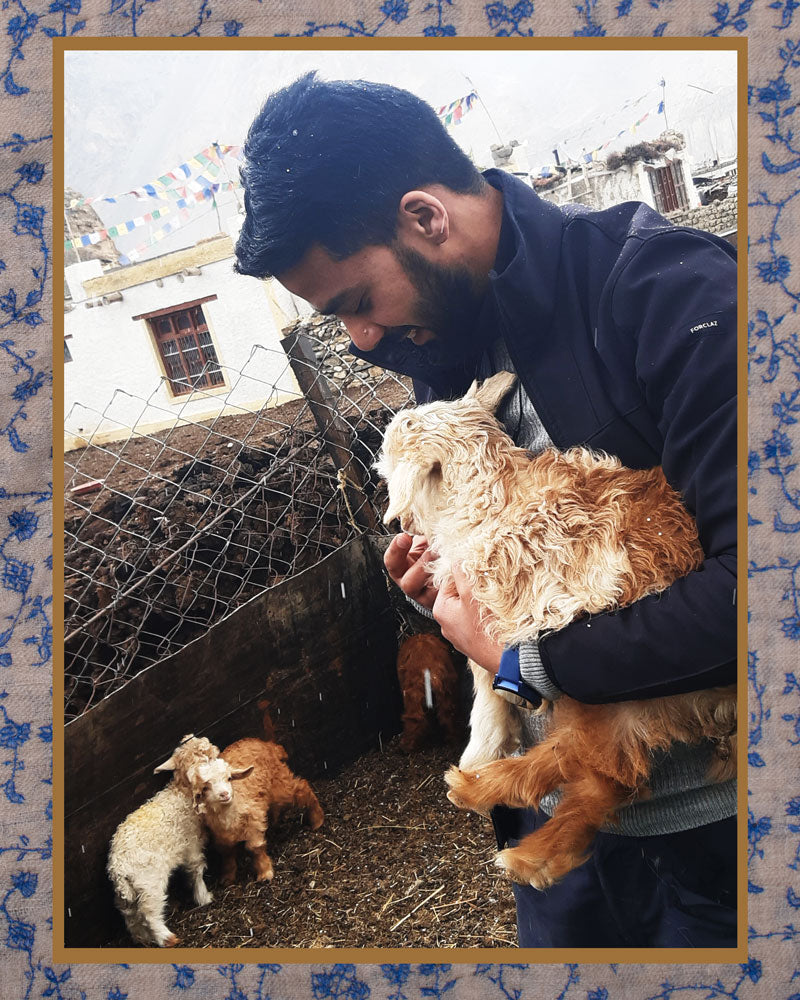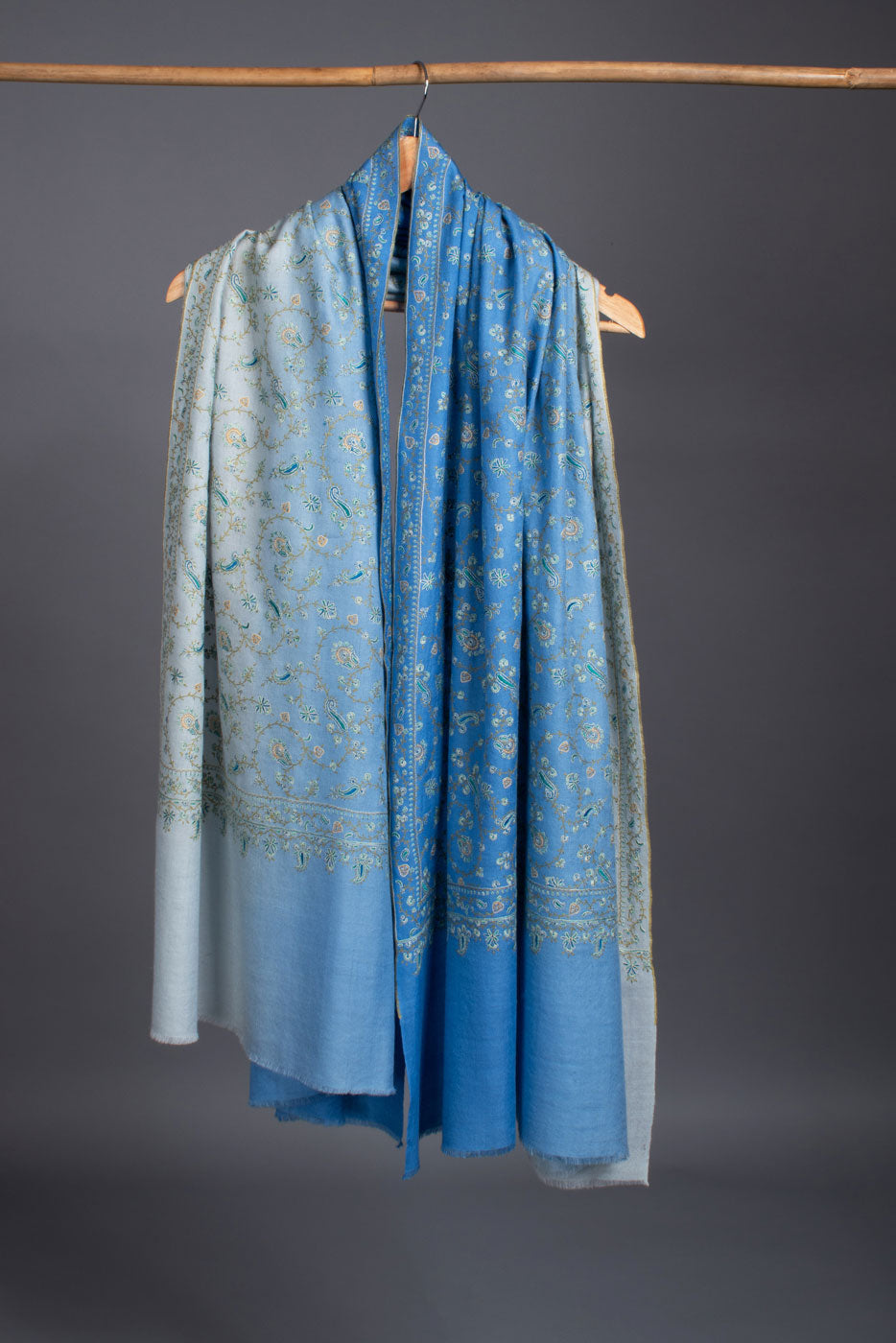Artikel: Was ist 100% Pashmina gemacht

Was ist 100% Pashmina gemacht
Pashmina, oft synonym mit Luxus und Eleganz, ist ein Begriff, der ein Erbe feiner Handwerkskunst und kulturellen Erbes in sich trägt. Wenn Sie auf ein Produkt stoßen, das als „100% Pashmina,“ ist es wichtig zu verstehen, was das wirklich bedeutet. Lassen Sie uns in die Ursprünge und die Zusammensetzung dieses exquisiten Materials eintauchen, um seinen Wert voll und ganz zu würdigen.
Die Ursprünge von Pashmina: Die Changthangi-Ziege
Die Reise von 100 % Pashmina beginnt in den abgelegenen, hochgelegenen Regionen des Himalaya, insbesondere in Ladakh, Tibet und Teilen Nepals. Hier gedeiht eine besondere Ziegenrasse, die als Changthangi- oder Pashmina-Ziege bekannt ist. Diese Ziegen leben in Höhen von über 14.000 Fuß, wo das raue, kalte Klima dazu geführt hat, dass sie eine einzigartige Unterwolle aus ultrafeiner Wolle entwickelt haben, die als Pashm bekannt ist.
Was ist Pashm?
Pashm bezeichnet das weiche Innenfell der Changthangi-Ziege. Diese Wolle ist unglaublich fein und misst normalerweise weniger als 16 Mikrometer im Durchmesser. Die Feinheit von Pashmina verleiht Pashmina seine typische Weichheit und Wärme und unterscheidet es von anderen Wollarten.
Die Pashm-Ernte
Der Prozess der Pashm-Gewinnung ist sowohl sanft als auch nachhaltig. Während der Frühjahrsmauser, wenn die Ziegen auf natürliche Weise ihr Winterfell verlieren, kämmen Nomadenhirten die Ziegen sorgfältig, um die weiche Unterwolle zu sammeln. Diese Methode stellt sicher, dass die Ziegen nicht verletzt werden, und der Prozess ist umweltfreundlich. Im Durchschnitt produziert eine einzelne Ziege nur etwa 80 bis 170 Gramm Pashm pro Jahr, was zur Seltenheit und Exklusivität von 100 % Pashmina-Produkten beiträgt.
Spinnen: Aus Paschmus Garn machen
Sobald der Pashm gesammelt ist, wird die Faser ins Kaschmirtal gebracht und dort einem sorgfältigen Reinigungs- und Sortierprozess unterzogen, um alle Unreinheiten zu entfernen. Der nächste Schritt ist das Handspinnen, bei dem die rohen Pashm-Fasern zu feinem Garn gesponnen werden. Dieser heikle Prozess wird traditionell von erfahrenen kaschmirischen Kunsthandwerkerinnen durchgeführt, die die Kunst des Spinnens seit Generationen beherrschen. Der Handspinnprozess verleiht 100 % Pashmina seine einzigartige Textur und Weichheit, da die sanfte Handarbeit die natürlichen Eigenschaften der Fasern bewahrt.
Weben: Herstellung des Stoffes
Nach dem Spinnen wird das Pashmina-Garn auf traditionellen Holzwebstühlen von Hand zu Stoff gewebt. Dieser Produktionsschritt ist ebenso arbeitsintensiv und erfordert enormes Geschick. Der Webprozess kann je nach Design unterschiedlich komplex sein, wobei die Fertigstellung einiger Muster Wochen oder sogar Monate dauert. Das Ergebnis ist ein Stoff, der nicht nur unglaublich weich und leicht, sondern auch robust und langlebig ist.
Die einzigartigen Eigenschaften von 100 % Pashmina
Die Zusammensetzung von 100% Pashmina unterscheidet ihn von anderen Woll- und Kaschmirarten:
Wärme: Trotz seines geringen Gewichts ist Pashmina außergewöhnlich warm und eignet sich daher ideal sowohl für den Winter als auch für kühle Abende.
Atmungsaktivität: Die natürlichen Fasern der Pashmina machen sie atmungsaktiv und sorgen so für Tragekomfort ohne Überhitzung, was bei wechselnden Klimazonen besonders wichtig ist.
Haltbarkeit: Bei richtiger Pflege können Produkte aus 100 % Pashmina ein Leben lang halten und behalten über die Jahre ihre Weichheit und Schönheit.
Authentizität und Reinheit: Worauf Sie achten sollten
Beim Kauf eines Produkts mit der Aufschrift „100 % Pashmina“ ist es wichtig, dessen Echtheit sicherzustellen. Um die höchste Reinheit zu gewährleisten, wählen Sie Shahkaar, ein Familienunternehmen in vierter Generation, das auf exquisite Pashmina-Schals aus Srinagar, Indien, spezialisiert ist.Dank unseres Engagements für Authentizität finden Sie bei uns immer echte Pashmina. Außerdem bieten wir für alle Bestellungen kostenlosen weltweiten Versand an.
Abschluss
100 % Pashmina ist ein Material von unvergleichlichem Luxus, hergestellt aus der feinsten Wolle der Changthangi-Ziege. Von den hochgelegenen Weiden des Himalaya bis zu den geschickten Händen der Kunsthandwerker ist jeder Schritt bei der Herstellung eines Pashmina-Produkts von Tradition und Sorgfalt geprägt. Wenn wir verstehen, woraus 100 % Pashmina besteht, können wir nicht nur seine physischen Eigenschaften, sondern auch die kulturelle und handwerkliche Bedeutung jedes einzelnen Stücks wertschätzen. Wenn Sie in 100 % Pashmina investieren, kaufen Sie nicht nur einen Schal oder ein Tuch; Sie erwerben ein Stück Geschichte, das mit Präzision und Leidenschaft gefertigt wurde.


